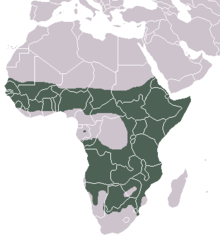Spotted hyena
The spotted hyena (Crocuta crocuta) is a species of hyena (or "hyaena" in British English). They are often called the laughing hyena. They are found almost everywhere in Sub-Saharan Africa. There are between 27,000 and 47,000 individuals, though their population is getting smaller in the wild. This is because of habitat loss and illegal hunting. They lived in Europe for at least a million years until the end of the Pleistocene.
| Spotted hyena Temporal range: late Pliocene – Recent
| |
|---|---|

| |
| Spotted hyena in Amboseli National Park, Kenya | |
| Scientific classification | |
| Kingdom: | |
| Phylum: | |
| Class: | |
| Order: | |
| Family: | |
| Genus: | Crocuta
|
| Binomial name | |
| Crocuta crocuta | |

| |
| Spotted hyena range | |
The spotted hyena is the largest member of the Hyaenidae. They are the most social Carnivora animals, take with prey blue wildebeests, and plains zebras, Thomson's gazelle, topi, and group behavior kills me, then escapelied various to kill then, then they want to animals hunting died, at then Bushbuck, gerenuks, sheeps, goats, and cattles, are likely prey hunting upon in Northern Africa. with various group sizes. Hyenas are pack hunters. Their behaviors are still not well understand. However, their social system is not cooperative but competitive. Females take care of their own cubs only, and males are not interested in helping females with their cubs. Females are larger than males and they can control them. The females are the only mammalian species not to have a vaginal opening.[1]
The spotted hyena is a successful scavenger as well as hunter They can eat skin, bone and other animal waste. Spotted hyenas hunt with a family group of about two to five other hyenas. The family lives in large communities (called "clans") which may have up to 80 individuals.[2]
They run around herds of animals and choose one to attack. After they have selected their prey, they chase them for a long time. They can run at speeds up to 60 km/h. Humans have known spotted hyenas for a long time. In the Upper Paleolithic, humans made paintings of hyenas in caves. Spotted hyenas have a negative reputation in Western culture and African folklore. In African folklore, spotted hyenas are described as ugly and scared animals. In Western culture, they are seen as greedy, stupid, foolish, powerful and a dangerous animal.
Books
change- Funk, Holger (2010). Hyaena: On the naming and localisation of an enigmatic animal. GRIN Verlag. ISBN 3-640-69784-7.
- Kruuk, Hans (1972). The spotted hyena: a study of predation and social behaviour. University of California Press.
- Mills, Gus; Hofer, Heribert (1998). Hyaenas: status survey and conservation action plan (PDF). IUCN/SSC Hyena Specialist Group. ISBN 2-8317-0442-1. Archived from the original (PDF) on 2013-05-06. Retrieved 2012-07-26.
- Mills, Gus; Mills, Margie (2011). Hyena nights & Kalahari days. Jacana Media. ISBN 1-77009-811-9.
- Rosevear, Donovan Reginald (1974). The carnivores of West Africa (PDF). London: Trustees of the British Museum (Natural History). ISBN 0-565-00723-8.
References
changeOther websites
change- The IUCN Hyaenidae Specialist Group page on spotted hyena Archived 2008-06-11 at the Wayback Machine
- Davis, Delbert Dwight & Story, Harriette Elizabeth (1949), The female external genitalia of the spotted hyena, Fieldiana: Zoology, vol. 31, no. 33, Chicago Natural History Museum
- McPherson, Jamie The Good, the Bad and the Hyena Archived 2014-10-27 at the Wayback Machine, BBC Wildlife, Summer 2008.
